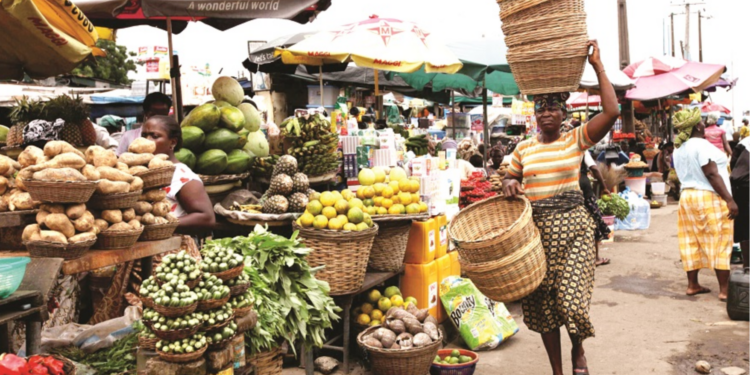
Tinubu pulls FCT out of TSA
October 15, 2023
Tonbra Nwosuagwu: Encouraging more women to occupy leadership roles vital for fostering diversity
October 23, 2023The recent lifting of foreign exchange restrictions on 43 items by the Central Bank of Nigeria (CBN) has sparked a debate among financial experts on its expected impact on rising food inflation in the country.
The CBN imposed the restrictions in June 2015 to conserve foreign exchange reserves and promote local production of certain goods, including about 11 food items.
However, the policy has been criticized by some experts who argue that it has led to higher prices of imported food items and contributed to food inflation.
The CBN had in a circular, published a list of imported goods and services that will not be eligible for foreign exchange in the Nigerian foreign currency market. The list which was originally 41 was updated to include two more items.
But in a statement issued in Abuja, the CBN said “importers of all the 43 items previously restricted by the 2015 circular referenced TED/FEM/FPC/GEN/01/010 and its addendums are now allowed to purchase foreign exchange in the Nigerian foreign exchange market.”
The reactions followed the rising food inflation in Nigeria which has significantly impacted the economy and the purchasing power of consumers in the country.
Food inflation: Nigeria’s inflation rate rose to 26.72% in September 2023 amid soaring food prices and harsh economic realities occasioned by the removal of fuel subsidies in May.
The Food inflation rate in September 2023 was 30.64% yearly, 7.30% points higher than the rate recorded in September 2022 (23.34%).
This has led to a decline in the purchasing power of Nigerians, particularly low-income earners, who find it difficult to afford necessities such as food, housing, and healthcare.
What the experts are saying: Some financial experts have expressed mixed feelings about the impact of the CBN’s decision on food inflation.
The former President and Chairman governing council of, the Chartered Institute of Stockbrokers (CIS) and the Managing Director, of Arthur Steven Asset Management Limited, Mr. Olatunde Amolegbe in an exclusive chat with Nairametrics said that lifting the foreign exchange restriction placed on the importation of 43 items may not have significant effects on the rising food inflation due to high exchange rate in the country.
- “We might not see a significant impact from lifting of the restriction on the items because the exchange rate is very high. I don’t know how importers will sell those foreign products profitably when they are brought into the country at the current high exchange rate. I think the impact of lifting the ban on the rising cost of food inflation will be muted. The exchange rate, which is a significant component of their costs, is already so high that I don’t know how they will bring it back profitably. In the medium run, the lifting of the ban will not have significant effects,” he said.
Amolegbe noted that he believed that what the CBN is trying to achieve is to harmonize all the items to determine what aggregate demands look like.
- “The truth of the matter is that we have a situation where some products from the FX market cannot determine what aggregate demand is.
- Whatever demand we have been capturing does not include those ban products. Presumably, those demands the CBN has locked out from the official market were pushing demand in the parallel market.
- I think what CBN is trying to achieve is to harmonize all markets to what the actual demand is. Bringing everything together is easier to determine when we have actual data regarding actual aggregate demand.
- So that we don’t end up in a situation where we push them into a black market that we are not capturing.
- Whatever policy the government is crafting will always fall because it is not capturing all the market participants,” he said.
Amolegbe explained that those food items that don’t have import substitution will not be affected, but that those items that have existing local items and couldn’t come in because of the CBN ban and which consumers have already embraced the locally produced goods will struggle to regain their market.
- “Those that have no local alternative will find a way of pricing their products such that the consumers will be able to afford,” he said.
He called on the government to address insecurity in the country which is threatening local production of foods adding that doing that will encourage local production and things will get better.
However, The Executive Vice Chairman, of Hicap Securities Limited, Mr. David Adonri also in an exclusive chat said that the lifting of the restriction will have a salutary effect on the rising food inflation notwithstanding the situation in the forex exchange market.
He noted that the domestic supply of foodstuffs has already dried up because of insecurity, adding that what is fueling food inflation is the excruciating scarcity of agricultural produce.
- “With the opening of the borders together with more importation of food items into the country, the food inflation will reduce.
- I agree that the issue of rising food inflation is due to the scarcity of food in the country. The terrorists and bandits are in full control of the rural economy and stopping farmers from assessing their farms,” he said.
He noted that since security forces have been overwhelmed and cannot recover the rural economy from the strangleholds of terrorists and bandits the only alternative is for food items to be imported irrespective of exchange rate conditions to fill the supply gap.




